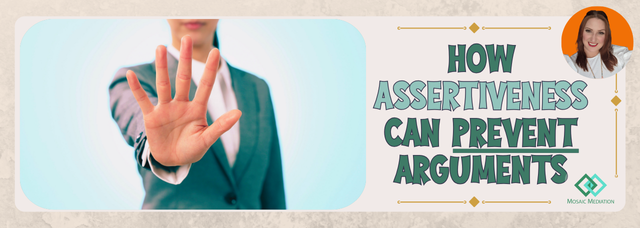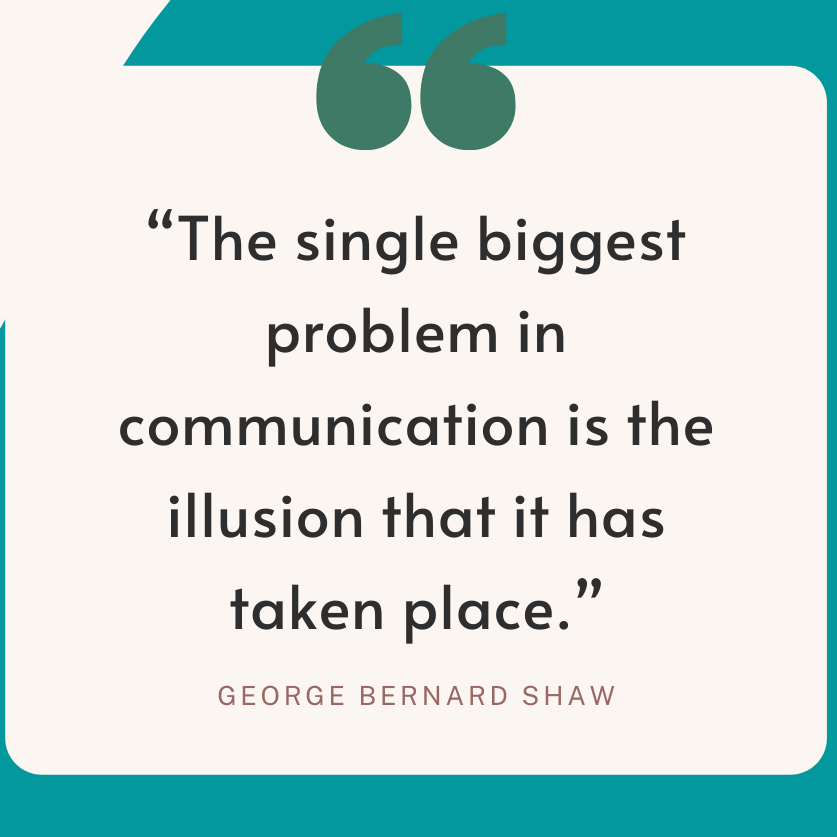There is a common misconception around assertive communication – that assertiveness instigates issues or arguments. However, in my experience as a mediator, for most of the disputes that I have been asked to intervene with, I notice a lack of assertiveness. And that if there had been some more assertive communication, the dispute was likely to have either been resolved or be less complex.
So, why does ‘assertiveness’ get a negative reputation at times?
Well, often because the behaviour that has been defined as assertiveness, is
not
assertiveness.
The behaviour that most people find irritating or too confrontational tends to be aggressive communication, where there might be unnecessary volume, an accusatory tone, speaking over others, not listening and a lack of demonstrating curiosity in communication.
What is assertive communication?
I would define ‘assertive communication’ as communicating clearly and confidently.
Assertiveness and arguments:
Conflict is part of life. As a mediator, my intention is not to prevent conflict in its entirety but to equip people to argue well, without any unnecessary complications or harmful escalation of conflict. What I notice is that painful arguments and misunderstandings occur most often when there is a ‘gap’.
There is a ‘gap’ in knowledge, understanding and communication ability. And, this gap is replaced by assumptions, unhelpful conclusions, and seeking support or guidance from those with a biased perspective. Essentially what happens is that when someone does not get clear and confident communication (assertiveness) from the other person, they form their conclusions – perhaps also influenced by the opinions of those around them.
When people get to a mediation session, I spend the majority of the first half of the session unpicking assumptions and miscommunications. Most of which would not have taken place if one or all of the parties felt confident and able to communicate directly with the other parties.
I have yet to do a mediation where there has
NOT been a moment where one party shares something which is ‘new information’ to the other. Though many people believe they know what the other person is thinking, in my experience they are very rarely correct.
The power of assertiveness
Assertiveness is not just about being seen as a ‘clear communicator’. It is a powerful tool for developing healthy communication patterns in relationships. By choosing to have awkward – yet essential – conversations, an opportunity is given for clarity between people. Such clarity can put a stop to questioning intentions, forming incorrect assumptions, and allowing the opinions of others to shape your thoughts about the other person. In essence, it can prevent unnecessary arguments.
Assertiveness can
inhibit resentment from developing. Although an individual may not speak up about their opinion on a subject, or their desire to be included in a project, or feels misunderstood or overlooked, this does not preclude them from feeling resentful. If instead, they feel equipped and empowered to communicate their thoughts, feelings and needs, they are more likely to be in a situation where they are listened to, understood and their needs met.
Assertiveness is
essential in establishing new boundaries and maintaining current healthy boundaries – in relationships at work and your personal life. People are much more likely to honour your boundaries if you can communicate them confidently and clearly.
Assertiveness is also a powerful conflict resolution tool as it can involve delivering your message with clarity, but also asking insightful questions to gain clarity for yourself. Which, in addition, demonstrates curiosity about the thoughts or feelings of the other person. When there is an expression of seeking to understand each other, it breaks down self-protective barriers and provides a pathway to empathy and connection.
To summarise…
Lack of assertive communication leads to:
ambiguity around intention and thoughts; resentments developing; unnecessary arguments; complex disputes involving others; and incorrect assumptions.
Whereas, feeling equipped and empowered to communicate assertively leads to:
open and honest communication; clarity around healthy boundaries; fast and effective conflict resolution; empathy and trust.
Why then, would you not choose to learn how to be more assertive in your communication?
For more information on conflict resolution go to
www.mosaicmediation.co.uk/workplace-mediation. For self-development resources on conflict management and assertive communication, check out the
‘Mosaic Mediation Vault’.












